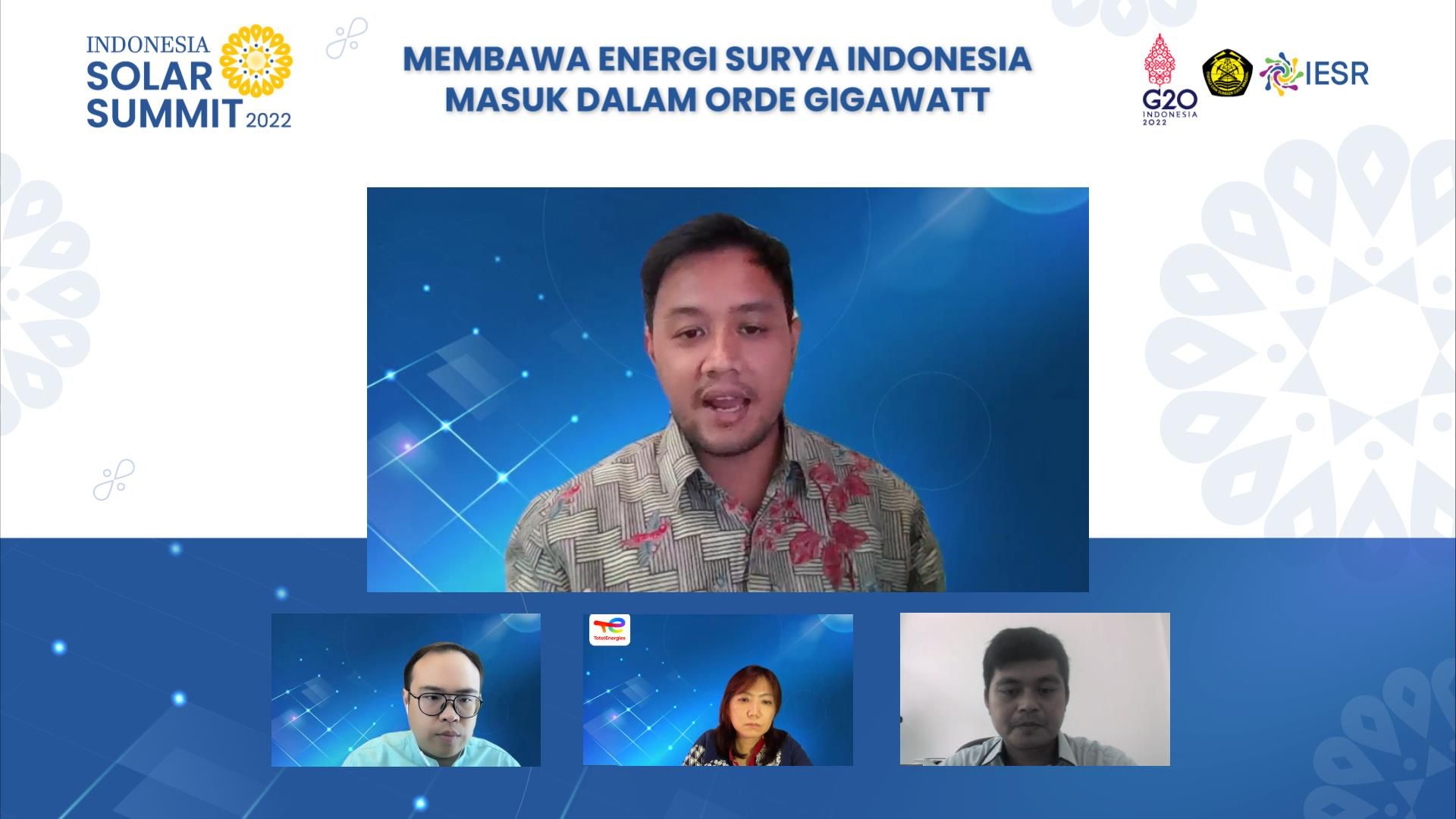Jakarta, 20 April 2022– One of the essential things in building a solar PV ecosystem in Indonesia is the readiness of its human resources. Measuring Indonesia’s readiness to enter the gigawatt order, the Institute for Essential Services Reform (IESR) in collaboration with the Ministry of Energy and Mineral Resources (ESDM) held a webinar entitled “Solar Energy Gigawatt Order, Is Indonesia Ready?” in the Indonesia Solar Summit 2022.
The General National Energy Plan (RUEN) targets a solar PV capacity of 6.5 GW in 2025. It opens up opportunities for high solar PV demand. RUEN also mandates the use of solar cells at a minimum of 30 percent of the roof area of all government buildings, and 25 percent of the roof area of luxury houses.
Anthony Utomo, Deputy Chairperson of the Indonesian Solar Energy Association (AESI), views that this opportunity needs to be met with the availability of local workers to provide, install, maintain and maintain solar PV.
“AESI in the solarpreneur program collaborates with universities so that training (related to rooftop solar PV) is available to the community, the installation can be served properly, and in the end it can create new jobs,” explained Anthony.
Ratna Muntiowati, Marketing Director, TotalEnergies Renewables DG emphasized that seeing the development of solar PV getting more and more widespread in Southeast Asia, therefore, in the near future, the solar PV market will not only be in Indonesia. Moreover, she stated that the curriculum of renewable energy should be applied in all science majors.
“Tantangan yang kita hadapi dalam instalasi di atas bangunan ialah struktur bangunan tidak terlalu kuat. Hal ini bisa juga dimasukkan ke dalam kurikulum pendidikan.Bahkan saat ini, Standar Nasional Indonesia (SNI) untuk civil construction, sudah memasukkan ketentuan untuk instalasi solar panel. Ini yang bisa diimplementasikan oleh lembaga pendidikan. Sehingga saat ada instalasi atau desain pabrik baru (untuk PLTS atap), sudah diperhitungkan sesuai SNI,”ujarnya.
Daniel Pianka, Universitas Kristen Immanuel (UNKRIM), Yogyakarta sepakat bahwa pelatihan dan edukasi energi terbarukan memainkan peran penting dalam membangun SDM yang berkualitas. Berdasarkan pembelajaran dari pemasangan 10 kWp panel surya di universitasnya, Daniel mengungkapkan bahwa kemampuan SDM yang mumpuni dalam melakukan instalasi panel surya turut menentukan keawetan sistem panel surya yang digunakan.
“Instalasi yang belum baik misalnya menyambungkan kabel hanya dengan isolasi (perekat) akan membuat kabel mudah terbakar jika ada daya yang tinggi. Instalasi yang berkualitas akan membuat sistem surya panel bisa digunakan lebih lama,” tuturnya.
Lebih lanjut, Daniel menjelaskan UKRIM telah membangun program energi. Program ini bertujuan untuk melatih mahasiswa, yang dominan berasal dari daerah 3T (Terdepan, Terpencil dan Tertinggal) untuk menjadi teknisi, melakukan instalasi yang rumit dan merawat PLTS.
“Program ini diharapkan mampu menghasilkan SDM yang terlatih dan termotivasi untuk terjun dalam sektor energi terbarukan, menciptakan banyak proyek energi berkelanjutan, gaya hidup yang lebih baik dan emisi karbon yang rendah,” tukasnya.
Di sisi lain, Eng Purnomo Sejati, Kepala SMK Ora et Labora, BSD menuturkan pihaknya senantiasa beradaptasi terhadap dinamika sektor energi di Indonesia. Semula, sekolahnya dirancang untuk memenuhi kebutuhan SDM pembangunan PLTU 35 GW. Namun, penyesuaian target baru terkait energi terbarukan maupun rencana moratorium PLTU, mendorong lembaga pendidikan yang ia pimpin bertransformasi menuju energi terbarukan.
“Sejak tahun lalu, kami bermanuver untuk membuka area lain seperti energi terbarukan dan surya. Kami sudah melakukan penetrasi dan bermitra dengan perusahaan terkait. Kami juga ingin mengembangkan kendaraan listrik, industrial internet of things (IIOT), dan perawatan gedung dan fasilitas. Bidang ini kami lihat yang akan sustain ke depan,” papar Purnomo.***
“The challenge we often face is the improper rooftop structure that is weak for solar PV installation. This issue can also be included in the education curriculum. Now, the Indonesian National Standard (SNI) for civil construction has included provisions for the installation of solar panels. Educational institutions can take this opportunity to implement. So when there is an installation or a new factory design (for rooftop solar PV), it has been calculated according to SNI,” she said.
Daniel Pianka, Immanuel Christian University (UNKRIM), Yogyakarta agreed that training and education on renewable energy play a significant role in shaping the quality of human resources. Based on lessons learned from the installation of 10 kWp solar panels at his university, Daniel revealed that the ability of qualified human resources to install solar panels also determines the durability of the solar panel system used.
“Improper installation, for example connecting cables only with adhesive tape will lead to burning cable, as comes the high power. A quality installation will make the solar panel system last longer, “he said.
Furthermore, Daniel explained that UKRIM had built an energy program. This program aims to train students, who predominantly come from 3T areas (frontier, remote, and left behind area) to become technicians, perform complex installations and maintain solar PV.
“This program is expected to produce trained and motivated human resources to engage in the renewable energy sector, creating many sustainable energy projects, better lifestyles, and low carbon emissions,” he said.
On the other hand, Eng Purnomo Sejati, Principal of Ora et Labora Vocational School, BSD said that his party always adapts to the dynamics of the energy sector in Indonesia. Initially, the school was designed to meet the human resource needs of the 35 GW coal-fired power plants construction. However, the adjustment of new targets related to renewable energy, as well as, the plan for a PLTU moratorium, has encouraged the educational institutions he leads to transform into renewable energy.
“Since last year, we have maneuvered to open up other areas such as renewable energy and solar. We have penetrated and partnered with related companies. We also want to develop electric vehicles, industrial internet of things (IIOT), and maintenance of buildings and facilities. We look at this field that will be sustainable in the future, “said Purnomo.

